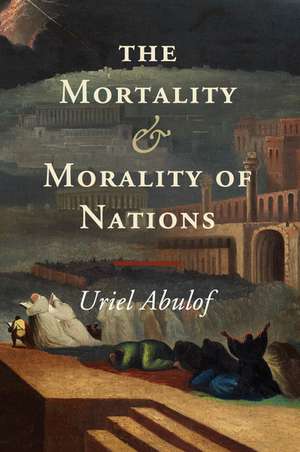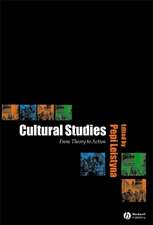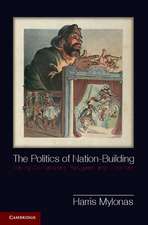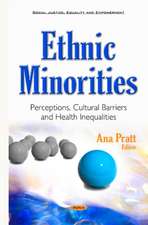The Mortality and Morality of Nations
Autor Uriel Abulofen Limba Engleză Paperback – 15 mar 2017
| Toate formatele și edițiile | Preț | Express |
|---|---|---|
| Paperback (1) | 323.65 lei 6-8 săpt. | |
| Cambridge University Press – 15 mar 2017 | 323.65 lei 6-8 săpt. | |
| Hardback (1) | 679.76 lei 6-8 săpt. | |
| Cambridge University Press – 23 iul 2015 | 679.76 lei 6-8 săpt. |
Preț: 323.65 lei
Nou
Puncte Express: 485
Preț estimativ în valută:
61.93€ • 64.96$ • 51.56£
61.93€ • 64.96$ • 51.56£
Carte tipărită la comandă
Livrare economică 01-15 aprilie
Preluare comenzi: 021 569.72.76
Specificații
ISBN-13: 9781107480865
ISBN-10: 1107480868
Pagini: 382
Ilustrații: 16 b/w illus. 5 tables
Dimensiuni: 150 x 230 x 26 mm
Greutate: 0.56 kg
Editura: Cambridge University Press
Colecția Cambridge University Press
Locul publicării:New York, United States
ISBN-10: 1107480868
Pagini: 382
Ilustrații: 16 b/w illus. 5 tables
Dimensiuni: 150 x 230 x 26 mm
Greutate: 0.56 kg
Editura: Cambridge University Press
Colecția Cambridge University Press
Locul publicării:New York, United States
Cuprins
Part I. Preface; Part II. Introduction: 1. Theory; 2. Case studies; Part III. Theory: 3. Meaning; 4. Mortality; 5. Morality; 6. Liberty; 7. Language; Part IV. The French Canadians: 8. The Canadiens: the emergence of an endangered ethnie; 9. The French Canadians: the rise and demise of ethno-religionism; 10. The Québécois: the rise and demise of ethnonationalism; Part V. Jews and Zionists: 11. Ontological insecurity: Jewish identity in modernity; 12. Epistemic insecurity: Jewish and Zionist survival in question; 13. Existential threats: Zionism's 'holes in the net'; 14. Existential threads: the lifelines of Zionism; Part VI. The Afrikaners: 15. Ontological insecurity: the birth of the Afrikaner ethnie; 16. Epistemic insecurity: Afrikaner survival in question; 17. Existential threats: Afrikanerdom's 'holes in the net'; 18. Existential threads: the lifelines of Afrikanerdom; 19. The twilight of apartheid and its aftermath.
Recenzii
'Uriel Abulof offers a fascinating exploration of the existential challenges faced by what Milan Kundera has dubbed 'small nations' - ethnonational communities that experience a profound sense of collective fragility. Theoretically ambitious and empirically rich, The Mortality and Morality of Nations delves into the self-understandings of the French Canadians of Québec, the Afrikaners of South Africa, and Israeli Jews to explain how common fears of national demise compel them to seek diverse means to bolster the moral foundations of their nationhood. This lucidly written study makes a unique contribution to our knowledge of politics, morality and security.' Matthew Evangelista, author of Gender, Nationalism, and War: Conflict on the Movie Screen (Cambridge, 2011)
'An unusual and impressive mix of theory and empirical research that helps us make sense of the ways in which nations deal with threats to their existence as distinct communities.' Bernard Yack, Lerman-Neubauer Professor of Democracy, Brandeis University, Massachusetts
'What Uriel Abulof has succeeded in doing is to take issues of political morality out of the ethereal philosophical plane and demonstrate how deeply embedded they are in the day-to-day rhetoric and practice of nationalism. While the primary focus here is on small, existentially vulnerable nations, the implications are sweepingly global, for in an age of nuclear deterrence, global terrorism, and environmental threats, the sense of existential dread extends to all peoples, large and small. This book is an intellectually ambitious undertaking of deep originality. It holds profound significance for our understanding of the interplay between ethics and identity in the politics of self-determination.' Aviel Roshwald, Georgetown University, Washington DC
'Uriel Abulof has written an original and deeply insightful comparison of three 'small peoples' - Israeli Jews, Afrikaners and Québecois - whose ethnic boundary-construction has been informed by a state of existential insecurity. As well written as it is timely, Abulof's book is essential reading for students of comparative politics, nationalism and conflict resolution.' Derek Penslar, University of Oxford
'This innovative study of 'small nation nationalism' focuses on a subjective sense of vulnerability rather than size. Uriel Abulof analyzes and compares three cases, using methods which make accessible mass data on popular and elite discourse. This enables him to offer persuasive arguments about such key questions as: who are we? Why are we? Will we continue to be? How will we continue to be? This illuminating publication should encourage similar investigations into other relevant cases.' John Breuilly, London School of Economics and Political Science
'The Mortality and Morality of Nations is a sophisticated and imaginative analysis of the debate over national survival, which is one that dominates the politics of deeply divided societies. On the one hand, there is the demand that national survival be safeguarded by any means and regardless of moral qualms. On the other hand, there is the insistence that a system based on injustice will, over the longer run, destroy a nation's soul. Uriel Abulof illuminates the severe tensions between imperatives of morality and mortality.' Hermann Giliomee, Professor Emeritus, University of Cape Town
'Rich in empirical detail and thoroughly grounded in political theory and philosophy, Uriel Abulof has written a deeply fascinating study of how small nations cope with challenges and threats to their survival and offers an inspired and telling comparison of French Canadians, Jews and Zionists, and Afrikaners that offers compelling insights into how small nations' collective identities and polities evolve and survive, over time.' Stefan Wolff, Institute for Conflict, Cooperation and Security, University of Birmingham
'In this highly original and fascinating book, Uriel Abulof draws attention to the role of ethnic groups and nations as subjects of the human quest for enduring meaning, sense of identity, and moral purpose that transcend transient individual existence. His subtle and elegant discussion of three cases - the French Canadians, Israeli Jews and Afrikaners - reveals the distinct and changing identity-defining frames and ethical discourses that each of these communities has evolved in its struggle to legitimize and self-justify its place in the world.' Azar Gat, author of Nations: The Long History and Deep Roots of Political Ethnicity and Nationalism (2013)
'[This] book, The Morality and Morality of Nations, offers a political scientist tackling some core issues about the nature of social and political groupings. It is a mixture of broad theorizing and in-depth historical analysis, and will be of interest to sociologists concerned with comparative historical processes and might generate interesting hypotheses for current cross-cultural work.' Steven Hitlin, Social Forces
'With The Mortality and Morality of Nations, [Abulof] manages to unsettle received truths on ethnonationalism, never shying away from comparisons that are as insightful as they are provocative. This is a timely book and an illuminating journey into the troubled world of ethnonationalists.' Niklas Plaetzer, The Review of Politics
'An unusual and impressive mix of theory and empirical research that helps us make sense of the ways in which nations deal with threats to their existence as distinct communities.' Bernard Yack, Lerman-Neubauer Professor of Democracy, Brandeis University, Massachusetts
'What Uriel Abulof has succeeded in doing is to take issues of political morality out of the ethereal philosophical plane and demonstrate how deeply embedded they are in the day-to-day rhetoric and practice of nationalism. While the primary focus here is on small, existentially vulnerable nations, the implications are sweepingly global, for in an age of nuclear deterrence, global terrorism, and environmental threats, the sense of existential dread extends to all peoples, large and small. This book is an intellectually ambitious undertaking of deep originality. It holds profound significance for our understanding of the interplay between ethics and identity in the politics of self-determination.' Aviel Roshwald, Georgetown University, Washington DC
'Uriel Abulof has written an original and deeply insightful comparison of three 'small peoples' - Israeli Jews, Afrikaners and Québecois - whose ethnic boundary-construction has been informed by a state of existential insecurity. As well written as it is timely, Abulof's book is essential reading for students of comparative politics, nationalism and conflict resolution.' Derek Penslar, University of Oxford
'This innovative study of 'small nation nationalism' focuses on a subjective sense of vulnerability rather than size. Uriel Abulof analyzes and compares three cases, using methods which make accessible mass data on popular and elite discourse. This enables him to offer persuasive arguments about such key questions as: who are we? Why are we? Will we continue to be? How will we continue to be? This illuminating publication should encourage similar investigations into other relevant cases.' John Breuilly, London School of Economics and Political Science
'The Mortality and Morality of Nations is a sophisticated and imaginative analysis of the debate over national survival, which is one that dominates the politics of deeply divided societies. On the one hand, there is the demand that national survival be safeguarded by any means and regardless of moral qualms. On the other hand, there is the insistence that a system based on injustice will, over the longer run, destroy a nation's soul. Uriel Abulof illuminates the severe tensions between imperatives of morality and mortality.' Hermann Giliomee, Professor Emeritus, University of Cape Town
'Rich in empirical detail and thoroughly grounded in political theory and philosophy, Uriel Abulof has written a deeply fascinating study of how small nations cope with challenges and threats to their survival and offers an inspired and telling comparison of French Canadians, Jews and Zionists, and Afrikaners that offers compelling insights into how small nations' collective identities and polities evolve and survive, over time.' Stefan Wolff, Institute for Conflict, Cooperation and Security, University of Birmingham
'In this highly original and fascinating book, Uriel Abulof draws attention to the role of ethnic groups and nations as subjects of the human quest for enduring meaning, sense of identity, and moral purpose that transcend transient individual existence. His subtle and elegant discussion of three cases - the French Canadians, Israeli Jews and Afrikaners - reveals the distinct and changing identity-defining frames and ethical discourses that each of these communities has evolved in its struggle to legitimize and self-justify its place in the world.' Azar Gat, author of Nations: The Long History and Deep Roots of Political Ethnicity and Nationalism (2013)
'[This] book, The Morality and Morality of Nations, offers a political scientist tackling some core issues about the nature of social and political groupings. It is a mixture of broad theorizing and in-depth historical analysis, and will be of interest to sociologists concerned with comparative historical processes and might generate interesting hypotheses for current cross-cultural work.' Steven Hitlin, Social Forces
'With The Mortality and Morality of Nations, [Abulof] manages to unsettle received truths on ethnonationalism, never shying away from comparisons that are as insightful as they are provocative. This is a timely book and an illuminating journey into the troubled world of ethnonationalists.' Niklas Plaetzer, The Review of Politics
Notă biografică
Descriere
This book answers how mortality and morality figure and intertwine in the life and death of nations - both in theory and in practice.














